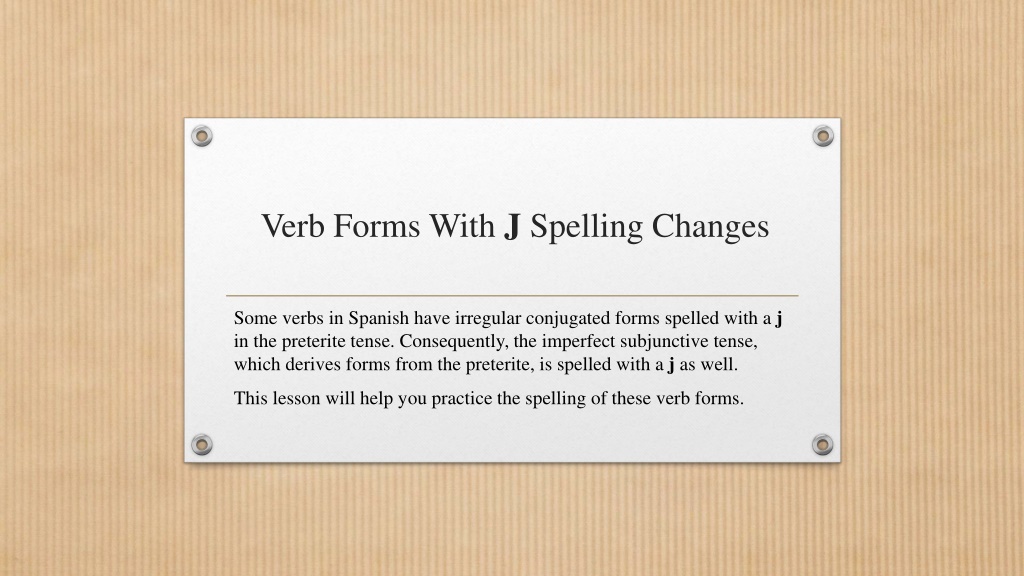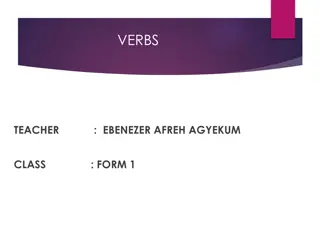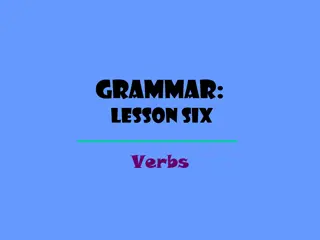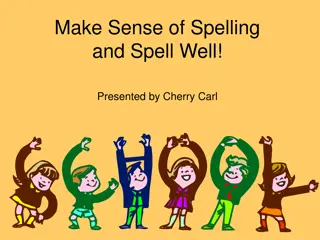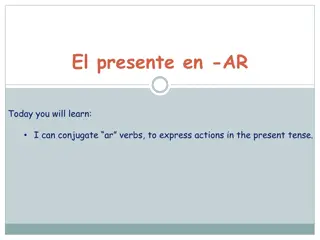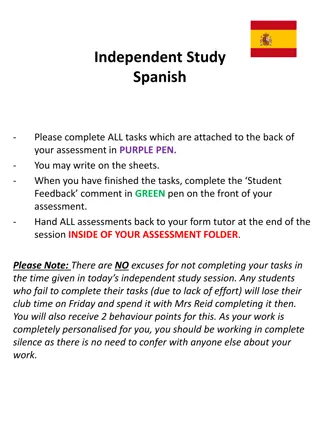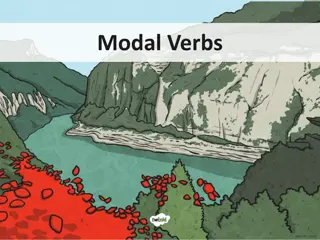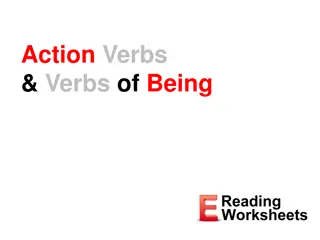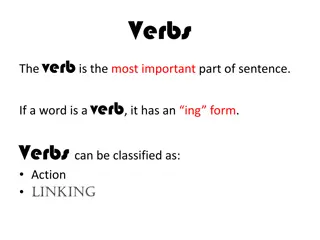Mastering Spanish Verbs with J Spelling Changes
Discover the irregular conjugated forms spelled with a 'j' in Spanish verbs in the preterite and imperfect subjunctive tenses. Practice the spelling of verbs like bendecir, introducir, traer, conducir, producir, decir, and traducir. Learn the preterite and imperfect subjunctive forms with 'j' spellings, understand when to use the preterite tense, and explore the -ra endings in the imperfect subjunctive for -ar, -er, and -ir verbs.
Download Presentation

Please find below an Image/Link to download the presentation.
The content on the website is provided AS IS for your information and personal use only. It may not be sold, licensed, or shared on other websites without obtaining consent from the author. Download presentation by click this link. If you encounter any issues during the download, it is possible that the publisher has removed the file from their server.
E N D
Presentation Transcript
Verb Forms With J Spelling Changes Some verbs in Spanish have irregular conjugated forms spelled with a j in the preterite tense. Consequently, the imperfect subjunctive tense, which derives forms from the preterite, is spelled with a j as well. This lesson will help you practice the spelling of these verb forms.
Some Common Verbs With J Spellings bendecir introducir traer conducir producir decir traducir
The Preterite Forms With J Spellings, Part I bendecir bendije, bendijiste, bendijo, bendijimos, bendijisteis, bendijeron conducir conduje, condujiste, condujo, condujimos, condujisteis, condujeron decir dije, dijiste, dijo, dijimos, dijisteis, dijeron introducir introduje, introdujiste, introdujo, introdujimos, introdujisteis, introdujeron producir produje, produjiste, produjo, produjimos, produjisteis, produjeron traducir traduje, tradujiste, tradujo, tradujimos, tradujisteis, tradujeron traer traje, trajiste, trajo, trajimos, trajisteis, trajeron
The Preterite Forms With J Spellings, Part II 1. Remember that the preterite is used mainly to talk about completed actions in the past. 2. Note that many of the verbs with J spellings in the preterite end in -cir, and some of those are derived from the verb decir. decir dije bendecir bendije 3. Note that the third person plural form (ellos/ellas, Uds.) is not spelled with an i after the j. traer trajeron conducir bendijeron
The Imperfect Subjunctive Forms With J Spellings 1. The imperfect subjunctive form is derived from the third person plural (ellos/ellas, Uds.) conjugation of the preterite tense. decir dijeron 2. Drop the -ron ending dijeron dije- 3. Add the correct ending from one of the set of the imperfect subjunctive endings (-ra or -se). See the next two slides. dije- dijera, dijeras, . . . / dijese, dijeses, . . .
The Imperfect Subjunctive: -RA Endings There are two sets of endings in the imperfect subjunctive: -ra and -se. The -ra endings are the more common endings in speech. Note that the endings are the same for -ar, -er, and -ir verbs. -ar Verbs -ra -ras -ra -ramos -rais -ran -er Verbs -ra -ras -ra -ramos -rais -ran -ir Verbs -ra -ras -ra -ramos -rais -ran yo t l/ella, Ud. nosotros/as vosotros/as ellos/ellas, Uds.
The Imperfect Subjunctive: -SE Endings -ar Verbs -er Verbs -ir Verbs yo -se -se -se t -ses -ses -ses l/ella, Ud. -se -se -se nosotros/as -semos -semos -semos vosotros/as -seis -seis -seis ellos/ellas, Uds. -sen -sen -sen
Accent on the Nosotros/as Forms Review the two full conjugations and note the accent on the nosotros/as forms. decir traer dijera dij ramos trajese traj semos dijeras dijerais trajeses trajeseis dijera dijeran trajese trajesen
Helpful Hints 1. Remember that -ar, -er, and -ir verbs share the same endings in the imperfect subjunctive. 2. Remember to add an accent mark to the last syllable of the stem in the nosotros/as imperfect subjunctive ending. decir: dije- + -ramos dij ramos producer: produje- + -semos produj semos
PrcticaA Write the preterite form for the pronoun indicated. 1. reducir (ellos) 2. conducir (nosotras) 3. decir (t ) 4. inducir (yo) 5. introducir ( l) 6. predecir (Ud.) 7. traer (Uds.) 8. predecir (ellas) 9. producir (nosotros) 10. bendecir (ella)
ANSWERS PrcticaA 1. redujeron 2. condujimos 3. dijiste 4. induje 5. introdujo 6. predijo 7. trajeron 8. predijeron 9. produjimos 10. bendijo
Prctica B Complete each sentence with the correct form of the imperfect subjunctive of the verb in parentheses. Use the ending set (-ra or -se) indicated. 1. Qui n _____ (-ra: traducir) m s r pido! 2. Era imposible que yo no _____ (-ra: decir) la verdad. 3. Me gustaba que t me _____ (-ra: traer) regalos. 4. Era una l stima que los pol ticos no _____ (-ra: reducir) los gastos innecesarios. 5. Con la tecnolog a nueva, ya no era necesario que los clientes _____ (-se: introducir) la tarjeta de cr dito en la m quina. 6. Mis padres esperaban que t _____ (-se: conducir) mejor. 7. En nuestra ltima clase, era muy importante que nosotros _____ (-se: producir) ensayos de buena calidad. 8. Era posible que el sacerdote nos _____ (-se: bendecir) antes de la misa.
ANSWERS Prctica B 1. tradujera 2. dijera 3. trajeras 4. redujeran 5. introdujesen 6. condujeses 7. produj semos 8. bendijese
